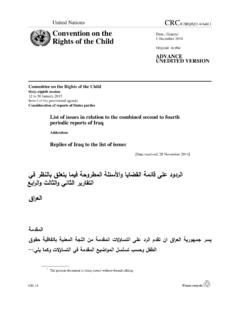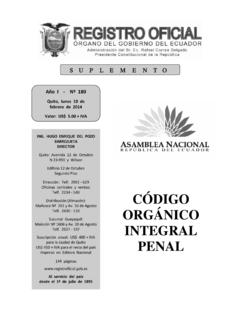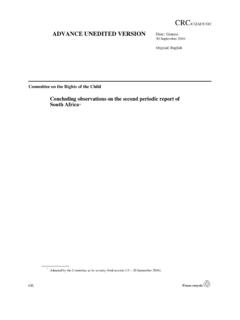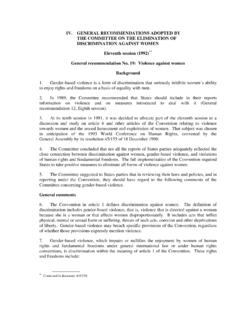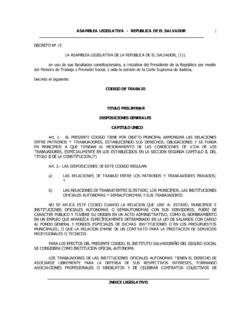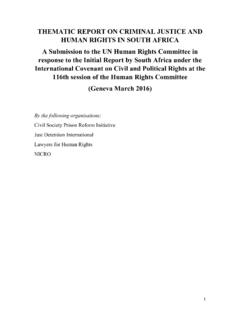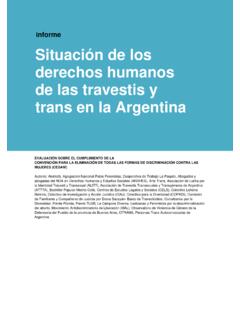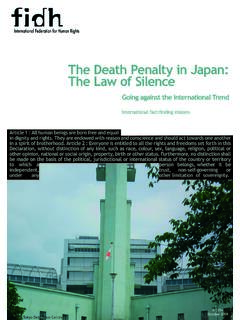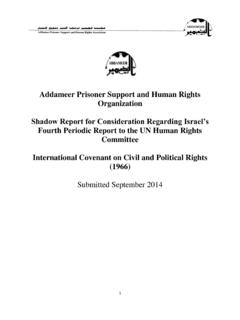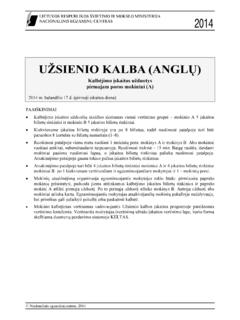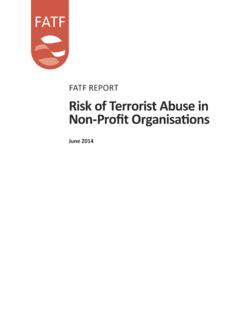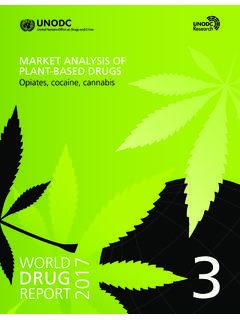Transcription of Concluding observations on the fourth and fifth …
1 committee against torture Concluding observations on the fourth and fifth periodic reports of Australia ADVANCE UNEDITED VERSION. 1. The committee against torture considered the combined fourth and fifth periodic reports of Australia (CAT/C/AUS/4-5) at its 1260th and 1263th meetings, held on 10 and 11 November 2014 (see CAT/ and 1263), and adopted at its 1284th and 1285th meetings, held on 26 November 2014 (see CAT/ and 1285), the following Concluding observations . A. Introduction 2. The Committee expresses its appreciation to the State party for having accepted the optional Simplified Reporting Procedure (LOIPR) allowing for a more focused dialogue between the State party and the Committee.
2 3. The Committee welcomes the interactive dialogue held with the State party's high- level multisectoral delegation, as well as the additional information and explanations provided by the delegation to the Committee. B. Positive aspects 4. The Committee welcomes the State party's ratification of or accession to the following international instruments: (a) The Convention on the Rights of Persons with Disabilities, in 2008;. (b) The Optional Protocol to the Convention on the Elimination of All Forms of Discrimination against Women, in 2008;. (c) The Optional Protocol to the Convention on the Rights of Persons with Disabilities, in 2009.
3 5. The Committee welcomes the legislative changes in areas of relevance to the Convention, including: (a) The Crimes Legislation Amendment ( torture Prohibition and Death Penalty Abolition) Act 2010, enacting a new offence of torture in the Criminal Code and ensuring non-reintroduction of the death penalty by a State or a Territory;. (b) The Human Rights (Parliamentary Scrutiny) Act 2011, which requires an assessment of compatibility of new legislation with human rights and establishes a Commonwealth Parliamentary Joint Committee dedicated to human rights scrutiny;. (c) The Family Law Legislation Amendment (Family Violence and Other Measures) Act 2011.
4 (d) The Extradition and Mutual Assistance in Criminal Matters Legislation Amendment Act 2012;. (e) The Crimes Legislation Amendment (Slavery, Slavery-like Conditions and People Trafficking) Act 2013;. (f) The Crimes Legislation Amendment (Law Enforcement Integrity, Vulnerable Witness Protection and Other Measures) Act 2013. 6. The Committee welcomes the efforts of the State party to give effect to the Convention, including: (a) The release of the National Human Rights Action Plan, in December 2012;. (b) The adoption of a National Action Plan to reduce Violence against Women and Their Children 2010-2022;. (c) The creation of the position of the Independent National Security Legislation Monitor in 2010, to, inter alia, review counter-terrorism and national security legislation taking into account international human rights obligations.
5 (d) The establishment of a public online database of recommendations from United Nations human rights mechanisms. 7. The Committee notes with appreciation the existence of a vibrant civil society that significantly contributes to the monitoring of torture and ill-treatment, thereby facilitating the effective implementation of the Convention in the State party. C. Principal subjects of concern and recommendations National Human Rights Institution 8. The Committee welcomes the work of the Australian Human Rights Commission. However, it notes that the Commission does not yet have statutory powers to monitor the implementation of the State party's obligations under the Convention (art.)
6 2). The State party should consider strengthening the Commission by providing it statutory powers to monitor the implementation of the State party's obligations under the Convention. Violence against women 9. While welcoming the legislative and other measures adopted by the State party to prevent and combat violence against women, the Committee notes with concern reports on the persistence of violence against women, which disproportionately affects indigenous women and women with disabilities. The Committee is also concerned at information received that over 50 percent of the cases of violence against women are not reported (arts.
7 2, 12, 13, 14 and 16). In light of its General Comment No. 2 (CAT/C/GC/2), the Committee recommends that the State party redouble its efforts to prevent and combat all forms of violence against women throughout its territory by inter alia: (a) Taking measures to facilitate the lodging of complaints by victims and to effectively address the barriers that may prevent women from reporting acts of violence against them;. (b) Ensuring the effective enforcement of the existing legal framework by promptly, effectively and impartially investigating all reports of violence and prosecuting and punishing perpetrators in accordance with the gravity of their acts.
8 (c) Strengthening public awareness-raising activities to fight violence against women and gender stereotypes;. 2. (d) Increasing its efforts to address violence against indigenous women and women with disabilities;. (e) Guaranteeing in practice that all victims benefit from protection and have access to sufficient and adequately funded medical and legal aid, psychosocial counselling and social support schemes, that take into account their special needs, and that victims not placed under the safe at home model have access to adequate shelters;. (f) Further intensify community based approaches to address violence against women with the involvement of all relevant stakeholders.
9 Trafficking in persons 10. The Committee greatly values the comprehensive and strong legislative framework and other measures adopted to address trafficking in persons. Human trafficking remains however a matter of concern as the State party reportedly continues to be a destination country. The Committee notes with satisfaction the Human Trafficking Visa Framework adopted by the State party. Temporary Bridging F visas are granted to any person identified as a suspected victim of human trafficking, but the further visas that would allow victims inter alia to have access to benefits of family reunification and effective support are linked to the involvement of the victim in criminal proceedings (arts.)
10 2, 12, 13, 14 and 16). The State party should continue and strengthen its efforts to combat trafficking in persons. In this respect, additional necessary measures required include: (a) Vigorously enforce the existing legislative framework and promptly, thoroughly and effectively investigate, prosecute and punish with appropriate penalties trafficking in persons and related practices, ensuring the allocation of all means required for such purpose;. (b) Guarantee that sustained, equal and effective assistance is provided to all victims of trafficking, in particular taking into consideration that in numerous circumstances victims are in a psychological or familiar situation that prevents them from participating in criminal proceedings.
